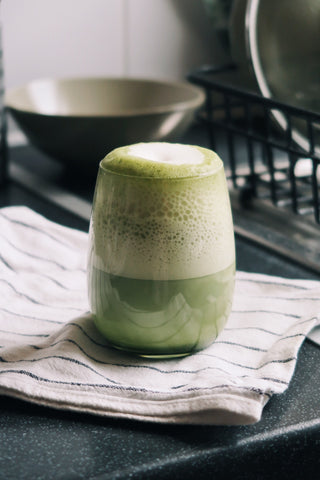Matcha for Memory: Boosting Cognitive Function with a Latte Brain Power
Welcome to the world of matcha – the green powder that’s been making waves in the wellness industry for years. Matcha has been hailed as a superfood for its numerous health benefits, including improved cognitive function and memory. And if you're wondering what matcha is, it's a form of green tea that's been ground into a fine powder. It's full of antioxidants, amino acids, and other essential nutrients that help your brain function at its best.
So, if you're looking for a natural way to boost your brain power, look no further than matcha. In this blog post, we'll explore how matcha can improve cognitive function and memory, and why it's an excellent addition to your daily routine. So, get ready to dive into the world of matcha!

Matcha for Memory: The Benefits of Matcha for Cognitive Function
Matcha is packed with brain-boosting nutrients that can help improve cognitive function. One of the key ingredients in matcha is L-Theanine, an amino acid that promotes relaxation and helps reduce stress. L-Theanine also increases alpha brain waves, which are linked to creativity and relaxation.
The caffeine in matcha also helps improve cognitive function by increasing alertness, concentration, and memory. Unlike coffee, matcha provides a more sustained energy boost without the jittery feeling that comes with a caffeine crash.
In addition to L-Theanine and caffeine, matcha is also rich in antioxidants, which help protect brain cells from damage caused by free radicals. Antioxidants are also linked to a reduced risk of cognitive decline and Alzheimer's disease.
Matcha for Memory
Matcha can also help improve memory by increasing blood flow to the brain. Studies have shown that the catechins in green tea, including matcha, help improve cognitive function and memory. Catechins are a type of antioxidant that protects the brain from damage caused by free radicals.
In one study, participants who consumed green tea daily for six months showed a significant improvement in memory compared to those who did not consume green tea. Another study found that green tea consumption was linked to a reduced risk of cognitive decline and dementia.
Matcha also contains EGCG, a type of catechin that has been shown to improve memory and cognitive function. EGCG helps increase the production of dopamine and serotonin, two neurotransmitters that are essential for cognitive function and mood regulation.

Matcha for Memory and Learning
Matcha is not only great for memory but also for learning. The caffeine in matcha helps increase focus and attention, making it easier to absorb new information. L-Theanine in matcha helps reduce anxiety and stress, which can hinder the learning process.
In one study, participants who consumed matcha tea showed improved cognitive function and attention compared to those who did not consume matcha. Another study found that the combination of L-Theanine and caffeine in matcha was more effective at improving cognitive function and attention than caffeine alone.
Matcha Latte: The Perfect Brain-Boosting Drink
One of the best ways to consume matcha is by drinking a matcha latte. Matcha lattes are a delicious and easy way to incorporate matcha into your daily routine. Plus, the combination of L-Theanine and caffeine in matcha makes it an excellent alternative to coffee.
To make a matcha latte, you will need:
- 1 teaspoon of Bonsai Cha matcha powder
- 1 cup of milk (dairy or non-dairy)
- 1 teaspoon of honey or sweetener of your choice
Directions:
- Froth the milk in your Bonsai Cha matcha maker. Pour into a glass.
- Add water to the first line of your matcha maker.
- Add 1 tsp. of matcha and blend.
- Add sweetener to the steamed milk and mix until combined.
- Pour the matcha over top and enjoy your brain-boosting matcha latte.

Matcha for Memory: A Versatile Ingredient for Recipes
Aside from drinking matcha as a latte, there are plenty of ways to incorporate matcha into your diet. Matcha can be used as a versatile ingredient in many recipes, including smoothies, baked goods, and even savory dishes.
Matcha smoothies are an excellent way to start your day with a boost of brain-boosting nutrients. Simply blend a teaspoon of matcha powder with your favorite fruits, vegetables, and milk of your choice for a delicious and nutritious smoothie.
Matcha can also be used in baked goods like cookies, cakes, and muffins. Adding matcha to your baked goods not only adds a unique flavor but also increases the nutritional value of your treats.
Savory dishes like matcha noodles or matcha-infused sauces are also gaining popularity. Matcha's earthy and slightly bitter flavor pairs well with savory dishes, and its antioxidant-rich properties make it a healthy addition to any meal.

Will Matcha Improve Your Memory?
In conclusion, matcha is a powerful superfood that can help improve cognitive function and memory. Matcha contains L-Theanine, caffeine, and antioxidants that work together to provide a sustained energy boost, reduce stress and anxiety, and protect brain cells from damage caused by free radicals.
Whether you prefer to drink matcha as a latte or use it as an ingredient in your favorite recipes, incorporating matcha into your daily routine is an excellent way to boost your brain power naturally. So, next time you're in need of a mental boost, skip the coffee and reach for a matcha latte instead.
With its numerous health benefits and delicious flavor, matcha is a versatile ingredient that can help you achieve optimal brain function and performance. So, go ahead and indulge in a brain-boosting matcha latte or whip up a batch of matcha cookies – your brain will thank you.

